
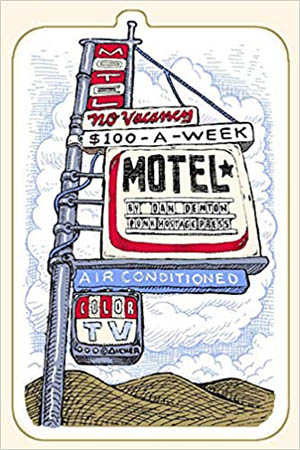 "$100-a-Week Hotel" by Dan Denton (Punk Hostage Press)
"$100-a-Week Hotel" by Dan Denton (Punk Hostage Press)
Holy Toledo! I read this book in just two sittings, even though I have awful eyesight and live in a dark trailer with crazy loud kid media blasting at me around the clock. It's that good, you won't want to put it down.
It's one of those rare books for people like me with short attention spans, it feels more like a movie or record, because his masterful and observant descriptions of everyday people struggling to survive under the boot of oligarchs and jackbooted Gestapo in the shadows of the dying empire's corporatized police state, where most wounded, helpless people are born into extreme poverty, abused, neglected, abandoned, and instructed to piss-test and compete for bottom-feeder, no future jobs that never pay a living wage.
Most of us never really stand a chance. It's refreshingly blunt and real, and does not suck-up to booj college standards of asskiss phoniness. It's the real story of plain-spoken, midwestern, working class heroes and heroines struggling to medicate their pain and find some sort of redeeming intimacies, grace and dignity, any consolation or impression of consolation, before passing out and waking up to a shrill clock radio.
People cannot stop themselves from dreaming, from seeking redemption in the arms of a gypsy-queen of the highway, and from sometimes, losing their cool and freaking the fuck out. All these characters are searching for some kind of higher power, divine intervention, warmth of home, even though they are mostly helpless, cursed, traumatized and all tragically ill prepared to meet the demands of rent and still have coins left over for some malt liquor and gas station food.
- Details
- By General Labor
- Hits: 4751
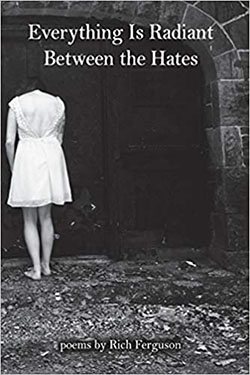 Everything is Radiant Between The Hates
Everything is Radiant Between The Hates
By Rich Ferguson
(Moon Tide Press)
Rich Ferguson is the best poet in the world, if you ask me. All his words have medicinal properties; they are magic spells and healing incantations. If you love John Cooper Clarke or Lydia Lunch, Exene, Nikki Giovanni, John Trudell or Tupac, you'll probably love Rich Ferguson, too.
If you are lonesome, isolated, alienated, suffering, worried, exiled, dry-drunk, evicted, locked-down, locked-out, tripled masked and permanently veiled in black lace mourning, abandoned, back-stabbed, betrayed, robbed, in grief, forlorn or melancholy, remember there is power in the word.
"Everything Is Radiant Between The Hates" is my newest sidekick, imaginary friend, silver bullet, rosary, garlic and crucifix, force field and holy water, pepper spray and hip-flask, trusty shank and pimp-stick, Marlboro Reds, harmonica, Roy Rogers holster, double secret fan club only secret decoder ring, 45 spindle, miniature spy camera, flashlight, utility-knife and I-phone. Flash Gordon spacegun. Secret scrolls, wobbly jukebox at the last greasy spoon in town. It's probably the most rocknroll artifact I've unearthed since the Humpers from Long Beach released that CD, "Positively Sick On Fourth Street", like 25 years ago.
If you're like me, you’re used to carryin' nothin, mighta spent most of your life empty pocketed, no watch, no wallet, no keys, no credit card, no proper identification, or name-tag, or money-clip, but once you get this book in your hands, you'll probably keep carrying it around with you. It's become essential to my sense of wellbeing, like a guitar slide, or bottle opener, Brill Cream and unbreakable comb. You won't leave home without it.
It's a Greyhound ticket to another time. Drinks for free. Mirrored sunglasses. Feather earring. The gospel truth confirming all the good ghosts you got floatin' around inside your traumatized skull. Like a rhinestone horseshoe, a Best Western ashtray, a universal remote, or black cat bone. It's like Pete Seeger's Wobblies songbooks. You better get a copy, now. Also look for "8th & Agony" (Punk Hostage Press).
- Details
- By General Labor
- Hits: 3142
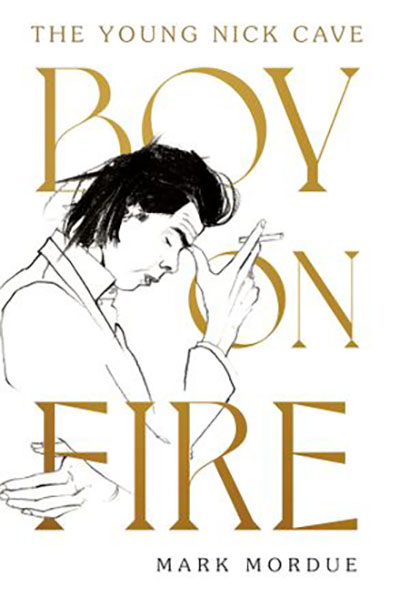 Boy on Fire. The Young Nick Cave
Boy on Fire. The Young Nick Cave
By Mark Mordue
(Harper Collins)
Lou Reed famously used the phrase "Growing Up in Public", but it's seriously arguable that he ever grew up at all. As represented in "Boy on Fire", Nick Cave grew up in public, and it's that Odyssean journey which we want to follow. 'Cause success, well, that's over-rated. It's nice that you're not poor anymore, but boy, if you had problems before, you could easily have a worse time dealing with them.
So author Mark Mordue begins with some of what he already knew, and of what we already know, before plunging down a rabbit-hole beset on all sides with imminent spiteful criticism, fact-checkers, poor-memory merchants and "it wasn't that way at all" keyboard numptys.
That he suspects what he's in for is quite clear from his early observation of the bond between Nick and his mum before Cave heads off to accept an ARIA Award in 2007. To his credit, although he was only nominated himself, Cave also inducted the other members of The Birthday Party and The Bad Seeds on the night. (Most annoyingly, he forgot to mention the band's original drummer, Phill Calvert).
Like I said, brave or damned foolish; it's hard to be a writer, not a hack, and make any money (Mordue has a day job, he's no fool). "Boy on Fire" deserves to be purchased for yourself, your friends and anyone you know interested in music. Period.
One reason is that, if you know enough about Cave, you'll also know that any decent book about him should always have a modicum of humour. I found myself chuckling out loud on the bus within minutes of beginning and, while it's not written with laughter in mind, you will find the several threads which Mark sets up quite early, vividly rewarding. Cave himself, an adventurous mischief-maker, possesses a savage and spontaneous wit, and his company can be addictive. Small wonder that so many who have encountered him either don't comprehend him, or find him boorish, or jaw-droppingly fascinating.
- Details
- By Robert Brokenmouth
- Hits: 4660
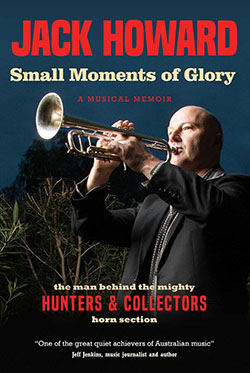 Small Moments of Glory By Jack Howard
Small Moments of Glory By Jack Howard
(Brolga Publishing)
Another in the Best Books I've Bought All Year Category.
Jack Howard kept a journal from before he joined Hunters and Collectors, and through most of his career with them; his horn work with other musicians predates Hunnas, continued while he was with them, and continues now. Clearly it's a life sentence.
Jack Howard avoids innumerable pitfalls by presenting a book which is purely one thing: older musician looks back on his life with accuracy and smarts, confesses that his early years were riddled with angst and neuroses and, clearly recoiling from his diaries in horror, declines to share the cringeworthy evidence. Instead (and instead of making up some cool-sounding mythology) Jack just says that it happened. And he moves on. Something we could all do well to remember.
"Small Moments of Glory" does not tell Jack's story from the perspective of a (cue neon sign, huge throbbing cathedral organ and scantily-clad models) ROCK GOD, but of a bloke who plays an instrument and starts playing in a few bands and, after a lot of hard touring and yakka and angst, one of these becomes a significant part of our country's backdrop.
- Details
- By Robert Brokenmouth
- Hits: 4521
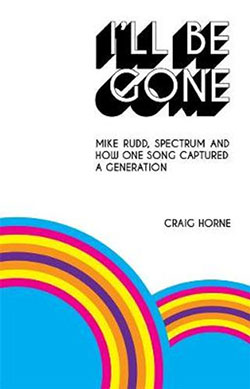 I’ll Be Gone: Mike Rudd, Spectrum and How One Song Captured a Generation
I’ll Be Gone: Mike Rudd, Spectrum and How One Song Captured a Generation
By Craig Horne (
Melbourne Books)
Craig Horne’s biography of New Zealand-born musician Mike Rudd comes with a lofty sub-titular proposition: "How One Song Captured a Generation". That song is Spectrum’s chart-topping 1971 hit, "I’ll Be Gone".
Horne’s biography is a valuable contribution to Australasian musical history. While Rudd’s trajectory as a musician and songwriter is common to many musicians, Horne’s methodical research and oral history charts the highs and lows of Rudd’s career in impressive detail.
Save for a few cursory mentions in John Dix’s chaotic history of New Zealand music, “Stranded in Paradise”, Rudd’s Christchurch r’n’b band, Chants (or Chants R’n’B), the frenetic band whose parochial popularity provided the basis for Rudd’s move across the Tasman in the late 1960s, is largely absent from the pages of musical history.
Rudd’s tenure in Ross Wilson’s Party Machine, covered previously in Horne’s biography of Daddy Cool, is recounted from a more nuanced, Rudd-oriented perspective. Spectrum rises, plateaus, recalibrates and fades away. Ariel teeters on the edge of commercial success, only for the record company to lose interest.
- Details
- By Patrick Emery
- Hits: 4010
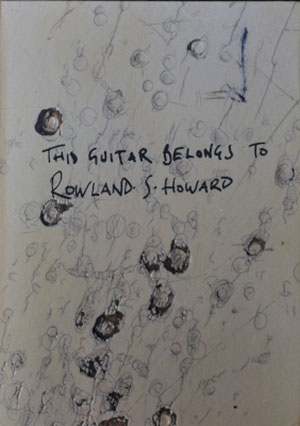 This Guitar Belongs to Rowland S. Howard
This Guitar Belongs to Rowland S. Howard
Edited by Harry Howard (Ledatape)
This is one of the best books I've bought all year.
Why do people buy books about musicians? For the sex, of course. And the glamour and excess. And to get the dirt. Or to try to understand a bit more about the tortured muse. Or because they're a completist.
What makes a music book crap? If it's not about someone you're interested in, if it's badly written, if it's not factual, if it's (Cardinal Sin Alert) boring.
Forget the words for the moment. "This Guitar Belongs To Rowland S. Howard" is one of the most beautiful books I've ever seen (and I've worked in an antiquarian bookshop for over 20 years).
- Details
- By Robert Brokenmouth
- Hits: 5837
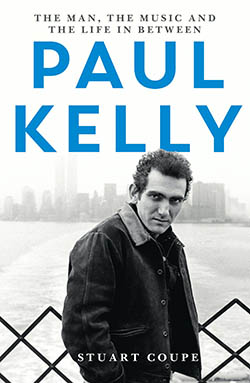 Paul Kelly: The Man, The Music And The Life In Between (Hachette Australia)
Paul Kelly: The Man, The Music And The Life In Between (Hachette Australia)
By Stuart Coupe
“I hear you like music. Do you like Paul Kelly? I’ve just been reading his autobiography, "How to Make Gravy". I love his music. Always have.”
It was an innocuous and inoffensive simple conversation starter one Sunday afternoon, uttered by a friend of my wife’s. To the extent there was question in there, it was almost opaque, and more likely rhetorical. Everyone likes Paul Kelly. How could anyone not like Paul Kelly? As it was, I fumbled around for an answer, and mumbled something about not having had the chance to listen to any of his music for a while.
It wasn’t as if I didn’t like Paul Kelly’s music. I’d first heard and seen him back in the early 1980s on Countdown with his then-band, The Dots. A few years later Kelly appeared again, this time with a new band, the Coloured Girls, and a batch of songs that would become staples of commercial radio playlists: "To Her Door", "Darling It Hurts", "From St Kilda to King’s Cross" and "Before Too Long".
- Details
- By Patrick Emery
- Hits: 6041
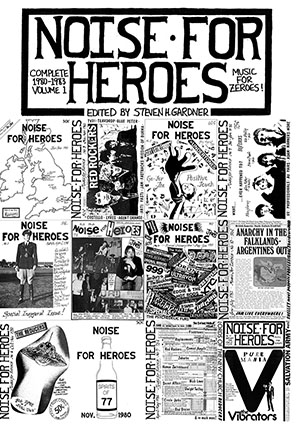 Noise for Heroes Complete 1980-83 Vol 1
Noise for Heroes Complete 1980-83 Vol 1
Noise for Heroes Complete 1988-91 Vol 2
Noise for Heroes Complete 1991-2004 Vol 3
Edited by Steve H. Gardner
Imagine a decade like the 1980s without zines. For the uninitiated (because they weren’t born then) zines were self-produced magazines, often photocopied and sometimes hand-drawn, focused on subjects that the authors were passionate about. More often than not, the topic was music.
It’s hard to overstate the importance of zines in a pre-Internet world. Along with college radio, they powered the American underground music circuit. In Australia, they connected underground bands, and fans across a country of disparate cities and gave insights into scenes overseas in a way mainstream music papers could never reflect. In Europe, they were oxygen for a culture considered low brow that fought to find an audience.
Zines were lapped up by people into punk, high-energy and left-of-centre music that didn’t manage to gain exposure elsewhere. They were the epitome of DIY culture, making the passion of others tangible. You’re “consuming” the digital equivalent of one right now.
One of the best was “Noise for Heroes” from San Diego, USA. The very lanky Steve Gardner kicked it off with some like-minded friends in 1980. It initially had a focus on punk rock. In its second life, it moved onto the Aussie and Scandinavian underground scenes with Gardner its writer rather than editor. Steve drummed in bands, ran his own record label, NKVD, and had a mail order music business.
- Details
- By The Barman
- Hits: 7074
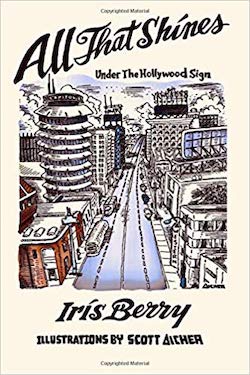 All That Shines Under The Hollywood Sign by Iris Berry (Punk Hostage Press)
All That Shines Under The Hollywood Sign by Iris Berry (Punk Hostage Press)
“It appeared clear to me - partly because of the lies that filled my history textbooks - that the intent of formal education was to inculcate obedience to a social order that did not deserve my loyalty. Defiance seemed the only dignified response to the adult world.”
- Timothy B. Tyson, Blood Done Sign My Name: A True Story)
“Most men today cannot conceive of a freedom that does not involve somebody's slavery. They do not want equality because the thrill of their happiness comes from having things that others have not.”
- W.E.B. DuBois, Darkwater: Voices from Within the Veil)
"The fortunate is seldom satisfied with the fact of being fortunate. Beyond this, he needs to know that he has a right to his good fortune. He wants to be convinced that he 'deserves' it, and above all that he deserves it in comparison with others. He wishes to be allowed the belief that the less fortunate also merely experiences his due. Good fortune thus wants to be 'legitimate' fortune." - Max Weber
"A catalog of catastrophic events shaped our lives..." - Iris Berry
ALMOST GOLD...
Iris Berry is my favorite movie star. In my personal rocknroll pantheon, she will always be the queen of the Hollywood underground. Hard livin' hellion, heroine, helper, healer, auteur, essayist. She lived on 10, on full-blast, for a long time, and has written several riveting books about it, including "Daughters Of Bastards", and her latest enchanting collection of poetic reminiscing's, "All That Shines Under The Hollywood Sign".
Part of the reason she is always such a big hit on the spoken word circuit is because we are all getting older and are increasingly nostalgic for our own wayward punk rock youth, and therefore, love hearing those far out and heavy, true tales from her seen it all history, but also, because something about her speaking voice is oh so very consoling and soothing, it is a tender, understanding salve for the sad and lonely, and scarred for life, all 'us last of the last, limping landmarks and leather clad convalescents. She has a comforting presence, because she emanates real deep, genuine article beauty, from the inside out. We can all recognize her as one of our kind.
- Details
- By Flash Rebel
- Hits: 6213
More Articles …
- Take The Fall for one Hex-cellent read
- A Big Beat that's worth every cent
- Go dancing with Kim Volkman
- Record Play Pause: Confessions of a Post-Punk Percussionist: The Joy Division Years by Stephen Morris (Hachette Australia)
- We Are The Clash: Reagan, Thatcher and The Last Stand of a Band That Mattered by Mark Andersen and Ralph Heibutzki (Akashic Books)
- The Haunted Writings of Lionel Johnson, the Decadent Era’s Dark Angel - Edited and with an essay by Nina Antonia (Strange Attractor Press)
Page 4 of 10


